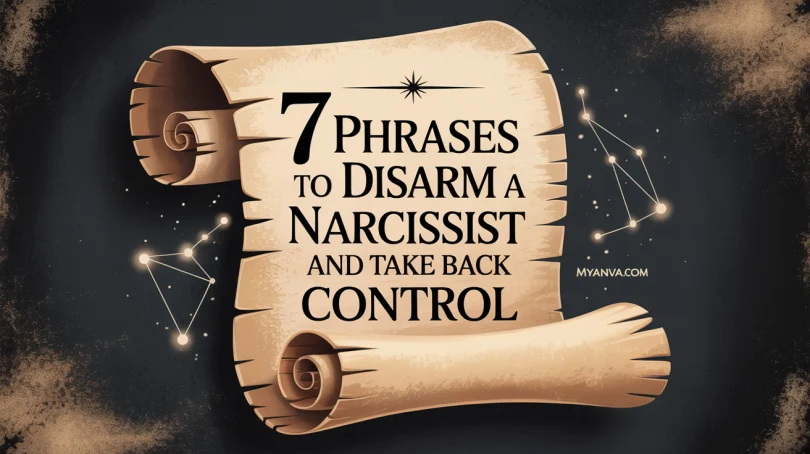Dealing with narcissistic individuals can be an exhausting and frustrating experience. You may find yourself replaying conversations, wishing you had said or done something differently, or feeling like nothing you say gets through.
Narcissists often twist reality to suit their narrative, leaving you questioning your perspective. While you cannot change a narcissist, you can control your responses and protect your mental health.
This blog post explores strategies and disarming phrases to help you maintain your boundaries and emotional well-being when interacting with narcissistic individuals.
Understanding Narcissistic Behavior
Narcissists thrive on control, conflict, and attention. They are uninterested in your perspective unless it aligns with theirs, and they often lack empathy, making them some of the most insensitive people you may encounter.
Their tactics, such as guilt-tripping, blaming, or provoking an argument, are designed to manipulate and dominate. Engaging with them can feel like an endless game in which they set and change the rules to suit their needs.
The key to managing these interactions is recognizing that you cannot reason with unreasonable people. Instead of trying to make them understand your point of view, focus on strategies that protect your peace and prevent their drama from derailing your emotional well-being.
Disarming Phrases to Protect Your Mental Health
Using carefully chosen phrases can help you maintain boundaries and avoid being drawn into a narcissist’s manipulative games. These phrases are not about changing the narcissist, they’re about preserving your own mental clarity and emotional stability. Here are some effective responses and when to use them:
1. “I Don’t Want to Argue About This”
Narcissists often provoke arguments to feed off the conflict or to avoid accountability. When they say, “I don’t want to argue,” they’re typically shutting down the conversation to dodge responsibility. You can use the same phrase to refuse to engage in their drama. By saying, “I don’t want to argue about this,” you shut down the conversation before it escalates, denying them the reaction they crave.
Example Scenario: A narcissist accuses you of starting an argument when you try to address an issue. Respond calmly with, “I don’t want to argue about this,” and disengage.
2. “That’s Your Opinion”
Narcissists present their perspectives as absolute truths and pressure you to agree. By responding with, “That’s your opinion,” you acknowledge their viewpoint without endorsing it. This phrase helps you maintain your reality and avoids unnecessary debates where they try to wear you down.
Example Scenario: A narcissist insists their way of doing something is the only correct way. Reply, “That’s your opinion,” to sidestep their attempt to control the narrative.
3. “I’m Sorry You Feel That Way”
Narcissists may try to make you feel guilty for their emotions or for upholding healthy boundaries. They might say, “I’m sorry you feel that way,” to deflect responsibility. You can use this phrase to express empathy without taking the blame for their feelings or actions. It allows you to stay compassionate while maintaining your boundaries.
Example Scenario: A narcissist blames you for their frustration over a reasonable boundary you’ve set. Respond, “I’m sorry you feel that way,” to acknowledge their emotions without accepting fault.
4. “Let’s Agree to Disagree”
This phrase is more for your mindset than for the narcissist, who may not take kindly to it. It reinforces that you don’t need to align with their perspective and helps you mentally disengage from their attempts to dominate the conversation.
Example Scenario: A narcissist insists on debating a point to prove they’re right. Say, “Let’s agree to disagree,” to end the conversation without giving in.
5. “Perhaps You Need to Work on That”
When a narcissist blames you for their problems or emotions, this phrase gently places accountability back on them. It reminds them that they are responsible for their feelings and actions, not you.
Example Scenario: A narcissist blames you for their bad mood after a disagreement. Respond, “Perhaps you need to work on that,” to redirect responsibility.
6. “I’ll Think About It”
Narcissists often pressure you into quick decisions that they can later use against you. Saying, “I’ll think about it,” buys you time to step back, assess the situation, and avoid being manipulated into immediate compliance.
Example Scenario: A narcissist pushes you to agree to a favor. Reply, “I’ll think about it,” to create distance and maintain control over your decision.
7. “You’re Entitled to Think That”
When a narcissist uses insults, passive-aggressive behavior, or guilt trips to provoke you, this phrase acknowledges their perspective without internalizing their criticism. It strips away their power to manipulate you emotionally.
Example Scenario: A narcissist makes a backhanded compliment to undermine your confidence. Respond, “You’re entitled to think that,” to dismiss their attempt to hurt you.
Practicing Emotional Resilience
Dealing with a narcissist is a process that requires practice, like exercising a muscle. The more you practice mindfulness and emotional awareness, the better you’ll become at recognizing their tactics and protecting your mental health. Here are some tips to build resilience:
- Stay Mindful: Pay attention to how you feel around the narcissist. If you notice yourself feeling drained, guilty, or frustrated, take a step back to assess the situation.
- Set Boundaries: Narcissists often push against boundaries, so be clear and consistent about what you will and won’t tolerate.
- Limit Engagement: Whenever possible, reduce contact with the narcissist. If you must interact, use the “gray rock” method, keep your responses neutral and unemotional to avoid giving them the attention they seek.
- Seek Support: Surround yourself with supportive people who validate your experiences and help you stay grounded.
When to Use These Strategies
While these phrases can be effective, they’re not suitable for every situation. If you live with a narcissistic partner or are in a high-stakes environment where their behavior could escalate, it’s often safer to disengage completely or seek professional guidance.
However, these phrases can be useful in lower-stakes scenarios, such as dealing with a toxic coworker or a manipulative family member at a gathering. Always prioritize your safety and well-being when deciding how to respond.
The Power of No Contact
The most effective way to protect yourself from a narcissist’s manipulation is to go no contact or limit contact as much as possible. When narcissists feel they’re losing control, they may escalate their tactics, making it critical to create distance. If no contact isn’t feasible, use these disarming phrases sparingly and focus on maintaining your emotional boundaries.
In short
Interacting with a narcissistic individual can feel like navigating a minefield, but you have the power to control your responses and protect your peace. By using disarming phrases and practicing emotional resilience, you can minimize their impact on your mental health and reclaim your sense of self. Remember that you deserve to live free from manipulation and drama. Take it one day at a time, and prioritize your well-being above all else.






